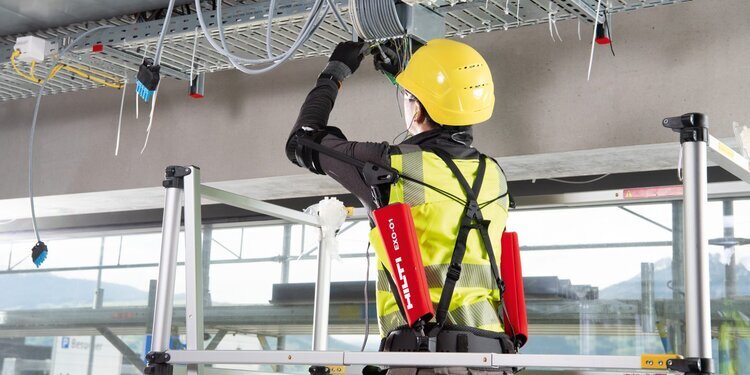There’s a small, but growing, fear in the construction industry that robots will soon make construction jobs obsolete, but, in all reality, the next logical step is for technology and robotics to first enhance the jobs of human construction workers. There is a lot of money being poured into the industry every day, looking for the next big piece of technology to take over jobsites by storm. A few recent examples are a bionic suit aimed at construction workers and an augmented reality smart hard hat. The next idea may make scaling walls at construction sites extremely easy.
Developed by the Defense Advanced Research Projects Agency (DARPA), the Z-Man grips were originally developed to help military personnel quickly scale buildings to get to safety. Inspired by the climbing abilities of geckos, the scientists went to work replicating their behavior for use by humans. After years of struggles, the group from Draper Labs in Massachusetts devised a series of tiny metal hooks that were strong enough to allow people to first climb brick buildings, and then used magnets to climb metal buildings, using similar techniques that spiders use to climb.
The problem continued to be non-magnetic and smooth walls. After utter despair set in for the scientists, the idea for suction was grips were born. Now, the prototype combines suction cup grips on the hands and foot stirrups that release the suction when lifted up, allowing that corresponding hand to move freely. According to Popular Mechanics, the wall climbing system will cost somewhere between $3-5,000. Though each type of climbing system (metal, brick, and smooth/non-magnetic) are currently separated onto unique devices, the group believes that all three climbing technologies will eventually all be combined into one device.
Full Story: Anyone Can Be Spider-Man With DARPA's Wall-Climbing Invention | Popular Mechanic
Last summer, Hilti announced that they had developed their first exoskeleton designed for construction tradespeople in a partnership with Ottobuck, a prosthetics, orthotics, and exoskeleton provider. Earlier this month, Hilti officially released the exoskeleton, announced more details, and published its retail price on their website.
Cat Phones is known to make some pretty rugged smartphones, the kind of phone you don’t have to worry about on the jobsite – even without a case. Licensed by the construction equipment giant, Caterpillar, the phones are made by the UK-based Bullitt Group. The company recently announced the release of their new flagship smartphone model, the CAT S62 Pro.
The construction technology world has been no stranger to acquisitions and mergers in recent years, as many larger players are gobbling up startups and other specialty software to quickly grow their offerings and expand their value to their customers. The latest acquisition comes from a somewhat surprising source, however, as Stanley Black & Decker, the power tool and storage company, has acquired Buildup, a task management, punch list, and inspection software company.
Father’s Day 2021 is June 20, so you better get started on gift ideas if you want to impress dad this year. Whether your father is contractor, handyman, or DIYer, we’ve got a lot of great ideas for him this year.
For more more gift ideas, be sure to check out our past Father's Day Gift Guides from 2016, 2017, 2018, and 2019 or our Ultimate Construction Holiday Gift Guides from 2015, 2016, 2017, 2018, 2019, and 2020
Procore, the construction management software company, has been rumored to be interested in filing for an IPO since at least 2019. In the Spring of 2020, Procore ended up delaying its plans to go public after it received $150million in funding and a valuation of around $5 million, citing interest in raising more money amidst an uncertain economy during the heart of the coronavirus pandemic.
It’s that time again to begin Construction Junkie’s annual search for the best construction podcast! Now in our 7th year of the competition, we’re noticing a considerable increase in construction-related podcasts from every sector.
While still new in the construction industries, robots are typically designed to perform a specific task in a highly precise and efficient way, like the rebar tying robot, Tybot or the brick-laying robot Hadrian X. More recently, though, robots are being imagined as platforms for 3rd party companies to develop hardware and accessories to attach to the base robot, like the Boston Dynamics robotic dog, Spot. I recently came across a new robot, called Baubot, which hopes to one day perform tasks using every tool on a typical jobsite.
Autodesk announced the impending release of 3 new products, combining the best of all of their existing products and adding new features, at last year’s virtual Autodesk University. Those products (Build, Takeoff, and BIM Collaborate) are now fully available on a global scale, with Takeoff being the most recent release.
Last summer, we learned that Travelers Insurance believed that using Procore as a project management tool helped contractors reduce risk on their projects so much that they were willing to help pay for them to join the platform. That deal was previously limited to customers in 10 US states, but Travelers and Procore have collaborated to further expand that program.











In the midst of fierce discourse over the bipartisan infrastructure bill lies a unique opportunity for the United States.